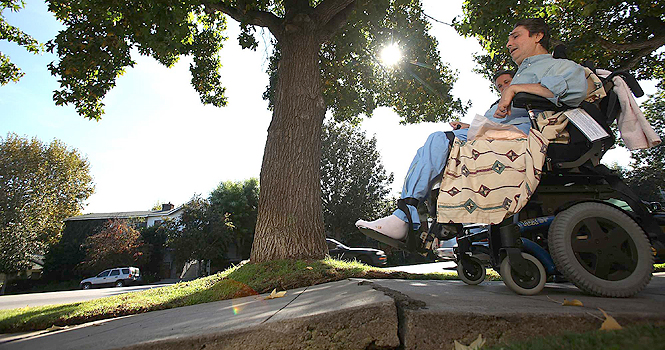KSU Grounds Department works to assist students with mobility impairments
Wheelchair-bound Brent Pilgreen, who has been a quadriplegic for 25 years, has a myriad of challenges posed by the poor condition of the sidewalks in his Van Nuys neighborhood in Los Angeles, Calif. Photo courtesy of Brian vander Brug/Los Angeles Times/MCT.
February 20, 2012
Kent State ADA committee keeps university in check
Last fall the ADA Oversight Committee was reinstated in order to oversee ongoing initiatives to improve the campus culture for students, staff, faculty and visitors with disabilities.
The Americans with Disabilities Act, enacted in 1990, prohibits discrimination on the basis of disability in employment, State and local government, public accommodations, commercial facilities, transportation and telecommunications.
According to the ADA Oversight Committee’s charge, the members will view compliance with federal guidelines to the minimal standard that must be maintained, and they are also to identify and do what is right in ways that advocate for the equal treatment of people with disabilities.
Quillin, who is the co-chair for the committee, said this means the committee is looking at the university as a whole and making sure it is complying with not just the letter of the ADA law, but also the spirit of the law. The other co-chair is Laura Dzurec, dean the College of Nursing. The committee is made up of three subcommittees consisting of about 25 students, faculty, deans and staff.
One issue they are currently discussing is how accessibility concerns in general get reported and resolved on campus, and how to respond to them. Quillin said they are proposing that one central place be designated for these concerns.
“We’re trying to get the ear of some of the people who make those campus-wide decisions and ask for an audience to say ‘hey, this is important,’” Quillin said, “and can we as a university look at this closely and with scrutiny to then make the changes we need.”
When there is snow, ice and slush on the ground during the winter months, students with mobility impairments may have a more difficult time getting around campus than others.
Amy Quillin, associate director for Student Accessibility Services, said last year about 30-50 students were registered with SAS as having mobility impairments. She said the severity of impairments ranges for students.
“It could be any number of things,” Quillin said, “ranging from wheelchairs and scooters to canes that the visually impaired use.”
Abigail Sachs, junior English major, has mild cerebral palsy and uses her power wheelchair and walker to get around campus fairly independently.
However, Sachs said she has noticed some problems this year regarding maintenance of ramped and flat sidewalks.
“The ramped area around the rear of the M.A.C.C. Annex nearly caused my chair to veer off into the wall,” she said, “and the other day my wheelchair got stuck in a snowdrift outside of Stopher Hall.”
Grounds Manager Heather White said she has heard of students getting stuck, but the hard thing is “we have about 21 miles of sidewalks and I have less grounds keepers than 21, so we have a lot of area,” she said.
White said her staff works from 6 a.m. to 2 p.m. to clear sidewalks, roads, steps and parking lots. She said handicapped ramps are always one of the first things to be cleared.
One thing White said Grounds does to assist students with mobility impairments is contact SAS in early October to find out where those students are living. Quillin said she gives White a list of what residence hall students with mobility impairments live in, and that list is distributed to the Grounds staff.
“[Grounds staff] work in areas so they need to know specifically what buildings, and we often have to think ahead not only where do they live but also where do we think they are going to eat and what are the most likely paths,” White said.
Quillin said one thing provided to students with mobility impairments is the PARTA door-to-door service. She said PARTA will pick up these students and take them to where they need to go.
“Generally those PARTA pick-up and drop-off places are fairly close to the building and are generally well maintained,” Quillin said.
Sachs said in addition to using her wheelchair, she also uses the PARTA bus system, “to which I am grateful,” she said.
White said Grounds also has a night crew, All Campus Preventative Maintenance, that will help students if small areas need to be shoveled or if areas surrounding automatic door openers are blocked.
“Students can call and [ACPM] will kind of hotspot the area,” White said. “If it’s really piling up and we know that we will just keep people extra.”
White said if there is a relatively small problem, students can call 330-672-2345, 24 hours a day, to get assistance.
Even though there are accommodations for students with mobility impairments, Quillin said there are some other ways the university could make mobility easier during the winter months, including heated sidewalks.
“I think that one of the challenges is handling a diverse population here,” she said. “We’ve looked at a lot of ways to staff, and we really think we are at the best way, and we keep evolving.”
Contact Caitlyn Callahan at [email protected].












